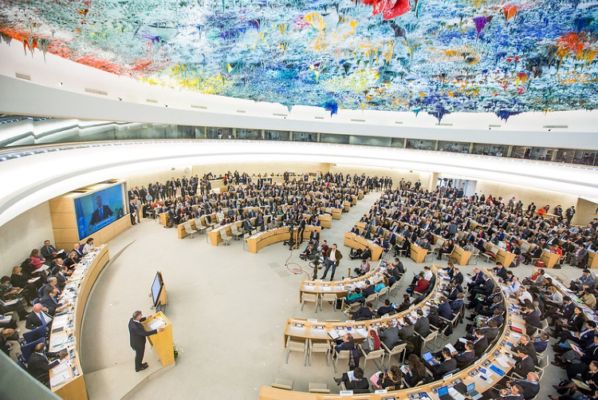
As regards global trends involving the death penalty, the annual report of the UN High Commissioner for Human Rights and the Secretary-General affirmed that the Kingdom of Saudi Arabia remains among thirty nations that continue to impose the death penalty in violation of its commitments in this regard.
The report, presented in the context of the 45th session of the Human Rights Council (14 September-2 October 2020), covered the period between May 2018 and May 2020 and highlighted initiatives to limit the use of this punishment and implement safeguards that guarantee protection for those threatened with execution. The report relies on several sources, such as reports from NGO’s, including ESOHR.
The report notes that Saudi Arabia is among the countries that supported, among the recommendations of the Universal Periodic Review, the discontinuation of the death penalty, or at least its restriction to the most serious crimes. In April 2020, Saudi Arabia announced certain restrictions on the death penalty, including ending its use against minors; however, this announcement raises concerns that this will not include all crimes. Despite its promises, Saudi Arabia has still carried out the death penalty against minors during the period covered by the report.
The report explains that Saudi Arabia has received letters from the UN and criticisms regarding its practices. For example, the Working Group on Arbitrary Detention condemned executions in cases during the period under its consideration and specifically requested a guarantee of physical and mental safety of persons. Among these was the case of Abbas al-Hassan, who was executed in April 2019.
Furthermore, the Special Rapporteur on the promotion and protection of human rights and fundamental freedoms while countering terrorism expressed his grave concern about the lack of due process in terrorism cases in Saudi Arabia, particularly in death penalty cases.
In addition, the UN High Commissioner and human rights mechanisms have expressed their concerns about the lack of fair trials in some death penalty cases in several countries, including Saudi Arabia.
The Committee on the Rights of Persons with Disabilities has urged Saudi Arabia to abolish the death penalty against persons with psychosocial or mental disabilities and to commute all current death sentences. The committee also issued a resolution in the case of detainee Munir Al Adam, whom Saudi Arabia nevertheless later executed.
During the reporting period, the High Commissioner harshly condemned the execution of 37 people, and mandate-holders at the HRC expressed their deep concerns over the incident, which included minors and a disabled person.
Over the time period it covered, the report noted that Saudi Arabia is among the countries that continue to carry out public executions. The High Commissioner mentioned a case where a man’s head was cut off and his body displayed in public. The Special Rapporteur on the promotion and protection of human rights and fundamental freedoms while countering terrorism stated that this method of execution is archaic, inhumane, and degrading to those condemned to death as well as to all spectators, and likewise demeans the people of Saudi Arabia as a whole.
The report notes that, on 2019’s World Day Against the Death Penalty, the European Union and the European Parliament stated that depriving children and families the right to bury or cremate the bodies of their loved ones violates their human rights, especially their right to be free of cruel or degrading treatment. In its responses to the letters of Special Rapporteurs, Saudi Arabia indicated that it buried the bodies of individuals it executed; yet the report noted that the bodies of some were kept from their relatives.
ESOHR stresses that, despite the Saudi government’s lack of transparency regarding its handling of the death penalty issue and the number of individuals currently facing the threat of execution, it has been able to document 53 cases of detainees facing execution. ESOHR has monitored violations of due process, and most of the detainees have not been charged with the most serious crimes under international law, but with charges of demonstrating and political activity.
Although the Saudi government promised to end the death penalty against minors in April 2020, it has not taken effective steps to protect the thirteen minors currently, nor has it notified their families and lawyers of any changes. ESOHR maintains that all the details presented in the report serve to increase fears for these minors and for all detainees who face death.
